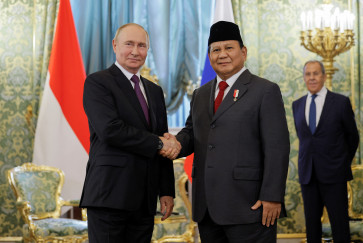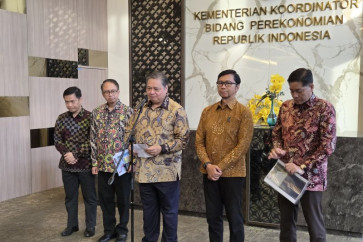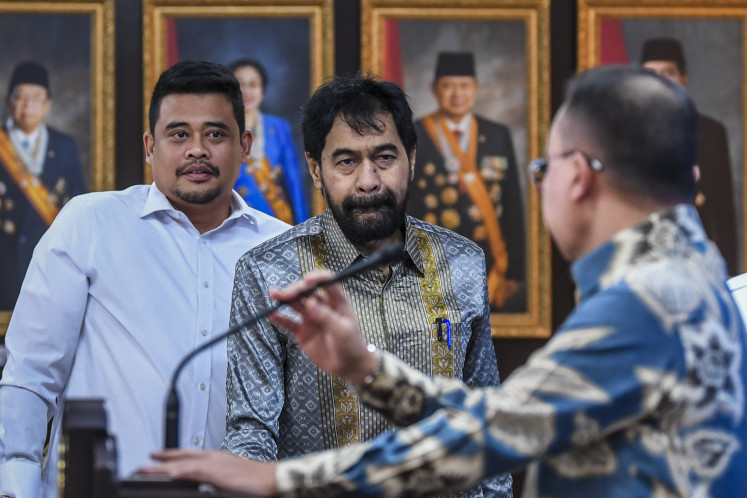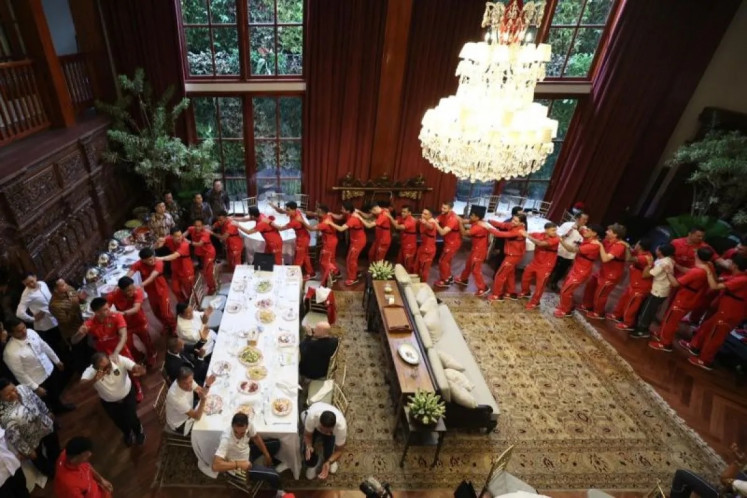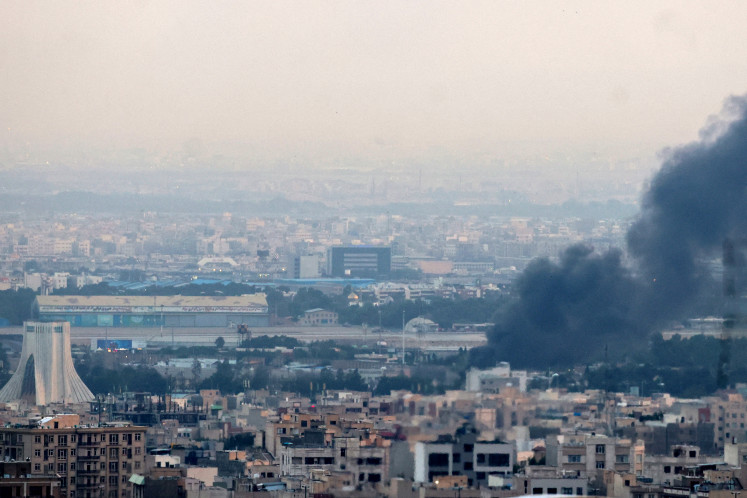Popular Reads
Top Results
Can't find what you're looking for?
View all search resultsPopular Reads
Top Results
Can't find what you're looking for?
View all search resultsIndians in Indonesia: What do you know about them?
The Indian community in Indonesia is like a United Nations because we have various types of Indians living on this beautiful archipelago
Change text size
Gift Premium Articles
to Anyone

The Indian community in Indonesia is like a United Nations because we have various types of Indians living on this beautiful archipelago. The majority of the Indians living here are Indonesian citizens. We also have people who hold Indian passports and we have Indian-Malaysians, Indian-Singaporeans, Indian-Americans, Indian-Australians, British Indians and so on.
Like Indonesians, members of the Indian community, who came from different ethnicities and speak various languages, embrace different religions like Hinduism, Islam, Christianity, Buddhism, Jainism and Sikhism.
How did Indians end up in Indonesia?
First, many people in Indonesia and India do not realize that they are maritime neighbors. People of both countries have inherited cultural heritages that are thousands of years old and have so many things in common.
The island of Java, the most populous island in Indonesia, was mentioned in the great Indian epic, Ramayana, under the name of Yavadwipa (Barley Island). It was one of the places where search parties were sent out for Sita, the wife of Rama, and it was by this name that the island was known to Ptolemy, the acclaimed geographer of the 2nd century AD.
In ancient times, Indians were well known as merchants and sailors, sailing to several countries in Southeast Asia for trade and to propagate Hinduism and Buddhism. These religious and trade missions to Southeast Asia had led to the establishment of several Hindu-Buddhist kingdoms in many countries.
In the past Indians were not known as a mobile people like the Jews and the Chinese. It was India’s colonial masters who contributed to Indian migration when they took Indian laborers to their colonies in many countries, including Indonesia.
The British rulers sent hundreds of thousands of illiterate villagers – mostly from the southern part of India – to countries like Sri Lanka, Indonesia, Malaysia, Fiji and Suriname as indentured laborers to work on tea, sugar and rubber plantations in the 18th and 19th centuries.
According to many people in Medan, North Sumatra, the Dutch colonial masters also brought Indian laborers to Sumatra to work in plantations in 17th century. Some soldiers serving in the British colonial army and British companies’ Indian employees deployed in Indonesia decided to stay.
Those laborers were the earliest members of the Indian Diaspora in Indonesia.
Then, another wave of Indian migrants – small-scale traders, professionals and laborers – ventured into Southeast Asia during the early part of the 20th century to test their luck. This happened during the time of the partition of India in 1947.
Gujarati and Bombay traders – mostly Sindhis, Parsis and Marathis, Sikhs and Tamils – belonged to this wave of migrants. They arrived in Indonesia independently – some with nothing but the clothes on their backs – to establish textile, iron and steel, shoe and sporting equipment businesses, small shops and other enterprises in major cities, including Medan, Jakarta, Surabaya, Bandung, Surakarta, Padang, Banda Aceh and Semarang.
Later, professionals and the educated elite of India arrived here seeking financial gain, particularly between 1990 and 1997 when Indonesia’s economy was booming.
This Indian expatriate group is made up of managers, accountants, entrepreneurs, teachers, information technology experts, bankers, traders, researchers, inventors, engineers and analysts. They work in various companies and organizations across Indonesia.
Besides advancing their own careers, members of the Indian community – both Indonesian citizens and Indian expatriates – have made significant contributions to their host country in many fields.
Some established schools of repute such as Gandhi Memorial Intercontinental School in Jakarta and Rama Global School and Rama Polytechnic, both in Purwakarta, West Java, thus contributing to the development of education in the country. There are also many Indian schools in Karawang and Bandung in West Java, Surabaya in East Java, Medan in North Sumatra and Denpasar on Bali.
__________________________________
"The Indian Diaspora represents the best of Indian culture, ethos and values.”
Indian Prime Minister Narendra Modi
The Indian community has been very active in charity and humanitarian activities. The unique thing about Indians in Indonesia is that they never have any problems with Indonesian people.
On the business side, there has been a tremendous increase in bilateral trade and investment during the last 10 years.
“We have altogether 400 Indian companies operating in Indonesia. These companies provide jobs to 250,000 Indonesians,” Indian Ambassador to Indonesia Nengcha Lhouvum told The Jakarta Post recently.
Indian companies, including Tata, Birla, Adani, Godrej, Bank of India and TVS, have been aggressively investing in Indonesia recently. Tema India, a major Indian group that is active in oil and gas, energy, engineering and manufacturing fields, is planning to enter the Indonesian market.
“Based on our estimates, the realized Indian cumulative investments in Indonesian reached almost US$15 billion,” Indian Embassy’s first secretary and commercial representative Anand Prakash told the Post.
Curiously, there is no official data on the strength of the Indian community in Indonesia. The estimates range between 100,000 and 300,000 people. Based on several calculations and estimates, there are maybe 50,000 Indians living in the Greater Jakarta area.
According to an estimate in the early 1990s, there were about 300,000 people of Indian descent living in North Sumatra alone, where the famous Kampung Keling (Indiatown) is located. Many of them have already left North Sumatra and migrated to Malaysia, Singapore and the Middle East. Most of them are still holding Indonesian passports. Some of them moved to Jakarta and other towns.
“There are only a few Indians living now in Kampung Keling,” said Rajan, who works as a parking attendant in Medan.
According to Indonesia’s Manpower Ministry, there are 5,100 Indian expats with permits to work in Indonesia. Local Indian community leaders have their own estimates.
“We have 1,500 Sindhi families in Jakarta, but I know Tamils are the biggest ethnic group in the Indian community in Indonesia,” Gandhi Seva Loka’s executive member and the chairman of Gandhi Memorial Intercontinental School, Suresh G. Vaswani, told the Post recently.
There are many Telugu, Kannada, Malayalam, Gujarathi, Marathi, Punjabi and Bengali families living in Jakarta and its surrounding areas.
In Jakarta, many ethnic Indians have moved to other areas from Pasar Baru, where they were traditionally located, to Sunter and other areas. Perhaps the reason was that both Kampung Keling and Pasar Baru are located in prime areas of the cities. Now that the land values have increased manyfold, they have been selling their homes and shops for high prices and moving to areas on the outskirts of the cities.
The fast-growing Indian expatriate community was badly affected by the 1997 financial crisis. Several hundred Indian expatriates lost their jobs and either went back to India or moved to other countries.
The latest wave of Indian expats – mostly highly qualified professionals – began in the 21st century. Many Indian professionals and companies have come to Indonesia and settled here. Cultural links – through Bollywood movies, songs, music, TV soap operas and yoga – between India and Indonesia have grown strongly. Indonesians developed a taste for Indian food, as is evident from the existence of more than 30 restaurants in Jakarta alone. The famous Dubai-based Indian retailer, the Lulu Group, last year opened its first hypermart in Jakarta.
Indians, wherever they are, have a good reputation as hardworking, disciplined and law-abiding people. They also easily mingle with local communities.
“The Indian Diaspora represents the best of Indian culture, ethos and values,” Indian Prime Minister Narendra Modi said in Bangalore recently while addressing the 14th Pravasi Bharatiya Divas, an event attended by 8,000 members of the Indian Diaspora from 30 countries. “They take our values and culture wherever they go.”


